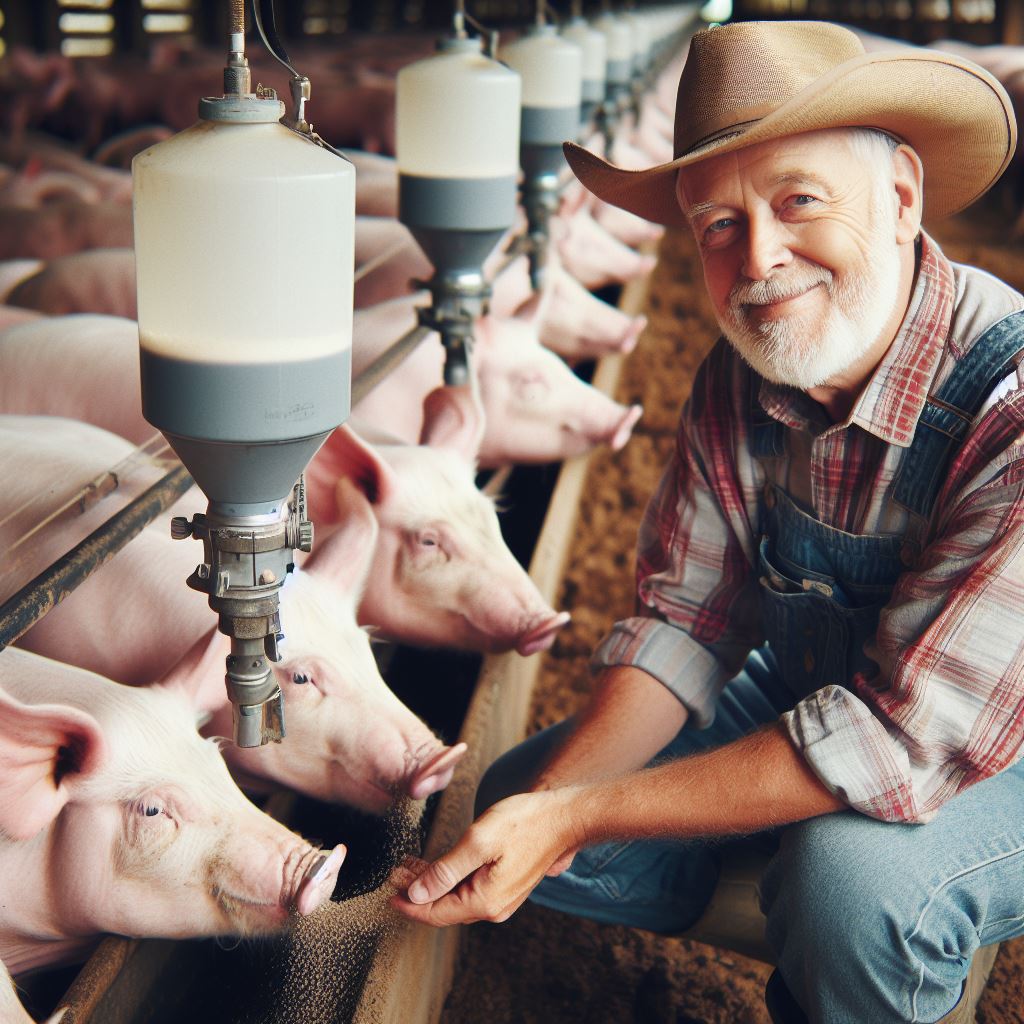Essential Equipment for Modern Pig Farms
Last Updated on March 2, 2024
Introduction
A. Importance of Modern Equipment in Pig Farming
In today’s dynamic pig farming landscape, embracing cutting-edge equipment is paramount.
Efficient tools not only enhance productivity but also streamline operations, ensuring sustainable success.
From precision feeding to waste management, modern pig farms demand top-notch gear.
B. Overview of the Upcoming Content
- Precision Feeding Systems: Achieve optimal growth with automated feeding solutions tailored to each pig’s nutritional needs.
- Climate Control Technologies: Maintain an ideal environment through advanced ventilation and heating systems.
- Automated Watering Systems: Ensure constant access to clean water, promoting pig health and well-being.
- Waste Management Solutions: Employ innovative methods to responsibly handle and utilize pig waste for sustainable farming.
- Health Monitoring Devices: Embrace technology-driven solutions for timely disease detection and preventive care.
- Handling and Sorting Equipment: Enhance efficiency and minimize stress during pig handling and sorting processes.
Equip your pig farm with these essentials, paving the way for a prosperous and sustainable future.
Housing and Handling Equipment
A. Importance of proper housing for pigs
- Comfortable and suitable housing conditions promote the well-being and productivity of pigs.
- Good housing design ensures proper ventilation, temperature control, and sanitation.
B. Types of pig housing equipment
1. Farrowing crates
- These provide sows a safe and controlled environment for giving birth and nursing piglets.
- Crates feature adjustable side rails to prevent crushing of piglets.
- They allow easy observation and access to newborn piglets.
2. Gestation crates
- Designed to provide individual housing for pregnant sows.
- They prevent aggression, injuries, and competition for food.
- Crates are equipped with feeding and watering systems for optimal nutrition.
3. Ventilation systems
- Vital for maintaining clean air, controlling temperature, and reducing humidity.
- Mechanical ventilation systems regulate air movement and prevent respiratory issues.
- Natural ventilation systems utilize air inlets, fans, and exhaust systems.
4. Automatic feeding systems
- These systems accurately provide food to pigs while minimizing waste.
- Computer-controlled feeders monitor individual pig’s feeding requirements.
- They ensure pigs have access to food at all times, promoting uniform growth.
C. Advantages and benefits of efficient handling equipment
1. Sorting boards and panels
- Facilitate the separation and grouping of pigs based on size, age, or health conditions.
- They minimize stress during sorting, vaccination, and transportation procedures.
- Boards and panels allow farmers to easily manage and maintain the pig population.
2. Electric prods and paddles
- Used to move pigs gently and efficiently, directing them where needed.
- Prods emit low-voltage electrical shocks, encouraging pigs to move without causing harm.
- Paddles are effective in guiding pigs during loading, unloading, or moving between pens.
3. Backing and crowd gates
- Essential for safely moving pigs through narrow spaces or passageways.
- Backing gates discourage pigs from moving backward, ensuring controlled movement.
- Crowd gates ensure smooth pig flow, preventing overcrowding and injuries.
Efficient housing and handling equipment play a crucial role in modern pig farms.
Providing suitable housing conditions promotes the well-being and productivity of pigs.
Good housing design considers factors like ventilation, temperature control, and sanitation.
Various types of housing equipment cater to specific pig needs.
Farrowing crates create secure and comfortable spaces for sows during the birthing and nursing process.
Gestation crates ensure individual housing for pregnant sows, minimizing aggression and promoting proper nutrition.
Ventilation systems maintain clean air quality, regulate temperature, and reduce humidity, preventing respiratory issues.
Automatic feeding systems accurately provide food to pigs, reducing waste and promoting uniform growth.
Efficient handling equipment simplifies pig management and reduces stress during sorting, vaccination, and transportation procedures.
Sorting boards and panels aid in grouping pigs based on various criteria, ensuring proper care and management.
Electric prods and paddles help gently move pigs without causing harm. Backing and crowd gates facilitate controlled pig movement through narrow spaces, preventing overcrowding and injuries.
In summary, proper housing and handling equipment are essential for modern pig farms. Utilizing the right equipment ensures the well-being and productivity of pigs, leading to successful and efficient farming operations.
Read: Optimal Goat Feed: Balancing Nutrition and Health

Feeding and Watering Equipment
Feeding and watering equipment play a crucial role in modern pig farming.
A proper feeding system is essential for the overall health and growth of pigs.
Without an adequate supply of food and water, pigs can suffer from malnutrition and various health issues.
Therefore, it is necessary to implement efficient feeding and watering methods in pig farms.
A. Significance of maintaining a proper feeding system
Maintaining a proper feeding system is of significant importance in pig farming.
Adequate nutrition is vital for the growth and development of pigs.
Properly fed pigs have better immune systems, higher weight gains, and improved overall health.
A well-designed feeding system ensures that pigs receive the required nutrients for optimal growth, resulting in better productivity and profitability for pig farmers.
B. Different methods of feeding pigs
There are different methods available for feeding pigs in modern farms. Troughs and feeders are commonly used to provide food to pigs.
These devices allow farmers to control the amount of feed given to each pig and prevent wastage.
Troughs can accommodate multiple pigs simultaneously, ensuring that all pigs have equal access to food.
Feeders can be adjusted to supply the right amount of feed based on the pigs’ age and weight.
C. Importance of suitable water supply for pigs
Another advanced option for feeding pigs is the use of automatic feeding systems.
These systems are equipped with sensors and timers to provide feed at regular intervals.
They can be programmed to dispense the right amount of feed, ensuring a consistent and balanced diet for the pigs.
Automatic feeding systems save time and labor for farmers, while also minimizing the risk of underfeeding or overfeeding the pigs.
In addition to a proper feeding system, maintaining a suitable water supply is vital for pig farms.
Pigs require access to clean and fresh water at all times. Watering systems and troughs are commonly used to provide water to pigs.
These systems ensure a continuous supply of water, accommodating multiple pigs simultaneously.
Pigs should have easy access to the water source, promoting hydration and overall well-being.
Nipple waterers are another widely used method for supplying water to pigs.
These devices consist of a nipple or valve that releases water when pigs bite or press on it.
Nipple waterers are more hygienic than traditional troughs, as they prevent pigs from contaminating the water with dirt or feces.
They also reduce water wastage, as pigs cannot easily spill or play with the water. Nipple waterers promote water conservation and help maintain a clean and healthy environment for the pigs.
Essentially, maintaining a proper feeding and watering system is crucial for modern pig farms
Investing in suitable equipment such as troughs, feeders, automatic feeding systems, watering systems, and nipple waterers ensures that pigs receive adequate nutrition and access to clean water.
Implementing efficient feeding and watering methods not only promotes the growth and health of pigs but also enhances productivity and profitability for pig farmers.
Read: Swine Flu: Protecting Your Pig Herds
Waste Management Equipment
Proper waste management is crucial in modern pig farms to ensure both environmental sustainability and the well-being of the animals.
Inefficient handling of waste can have severe consequences, ranging from environmental contamination to the compromised health and hygiene of the pigs.
A. The importance of efficient waste management in pig farms
Improper waste management practices have significant environmental implications.
When waste is not adequately stored or disposed of, it can seep into the surrounding soil and water sources, contaminating them with pollutants.
This can negatively impact the local ecosystem and pose a threat to other animals and plant life in the area.
Furthermore, the health and hygiene of pigs are directly affected by poor waste management.
Accumulated waste can serve as a breeding ground for bacteria, parasites, and other harmful pathogens.
Pigs living in such unsanitary conditions are more prone to diseases, which can lead to decreased productivity and increased mortality rates.
B. Types of waste management equipment
To address these challenges, modern pig farms utilize various waste management equipment.
Slurry storage tanks are paramount for storing and managing the liquid waste produced by the pigs.
These tanks ensure that the waste is contained and can be efficiently transported for proper disposal or treatment.
Another essential equipment used in waste management is the manure separator.
This device helps in separating solid waste from liquid, making it easier to handle and dispose of each component separately.
The solid waste can be utilized as fertilizer or sent for further processing, while the liquid waste can be treated or utilized for irrigation purposes.
Compost systems are also commonly employed on pig farms. These systems facilitate the decomposition of organic waste, such as leftover feed and bedding, into nutrient-rich compost.
The compost can then be used as an organic fertilizer, reducing the reliance on chemical fertilizers and promoting sustainable farming practices.
C. Benefits of proper waste management in pig farms
Proper waste management in pig farms brings forth numerous benefits. Firstly, it contributes to environmental sustainability.
By effectively managing and treating waste, the impact on the environment is minimized, reducing pollution and preserving natural resources.
Additionally, proper waste management helps in controlling odor and disease risks. The accumulation of waste can generate unpleasant odors, which can be a nuisance for nearby communities.
Implementing efficient waste management practices significantly reduces odor emissions, creating a more pleasant environment for both pigs and workers.
Furthermore, by managing waste effectively, the risk of disease outbreaks is significantly reduced. The presence of waste serves as a breeding ground for harmful pathogens, which can lead to the spread of diseases among pigs.
By ensuring proper waste management, the likelihood of disease transmission is minimized, leading to healthier and more productive pigs.
In fact, efficient waste management is crucial in modern pig farms.
The use of equipment such as slurry storage tanks, manure separators, and compost systems plays a significant role in maintaining environmental sustainability and promoting the health and hygiene of the pigs.
It is essential for pig farmers to prioritize and invest in proper waste management practices to ensure the long-term success and sustainability of their operations.
Read: Robotics in Poultry Farming: The Future Is Here
Health and Safety Equipment
A. The Significance of Safety Measures in Modern Pig Farming
Safety is paramount in modern pig farming, ensuring the well-being of both farmers and pigs.
Implementing rigorous safety measures is not just a regulatory requirement; it is a commitment to fostering a secure and productive farming environment.
B. Essential Health and Safety Equipment for Pig Farms
1. Personal Protective Equipment (PPE)
- Coveralls: Guard against contaminants, minimizing the risk of disease transmission.
- Gloves: Protect hands from cuts, scratches, and harmful substances during daily tasks.
- Respirators: Shield against airborne particles, vital in dusty or biohazardous environments.
- Steel-toed boots: Prevent foot injuries, especially when handling heavy equipment.
2. First Aid Kits
- Fully stocked and strategically placed for quick access during emergencies.
- Essential supplies: Bandages, antiseptics, scissors, and a first aid manual.
- Regular checks and replenishments ensure readiness for unforeseen incidents.
3. Fire Extinguishers and Alarms
- Portable extinguishers located strategically across the farm for rapid response.
- Fire alarms: Installed to provide early warnings and prevent extensive damage.
- Staff trained in fire safety protocols for a swift and coordinated response.
4. Emergency Response Plans
- Comprehensive plans outlining procedures for various emergencies.
- Regular drills to familiarize farm personnel with emergency protocols.
- Clear communication channels established to coordinate responses effectively.
- Evacuation routes prominently displayed, ensuring everyone knows the way to safety.
In the dynamic environment of a pig farm, these health and safety measures are not just safeguards but integral components for a smooth operation.
Investing in the well-being of personnel and establishing robust emergency protocols ensures that modern pig farming remains not only productive but also a secure and sustainable endeavor.
Read: Robotics in Poultry Farming: The Future Is Here
You Might Also Like: Pig Farming Essentials: A Beginner’s Guide
Conclusion
A. Recap of the importance of essential equipment in modern pig farms
The use of essential equipment is crucial for modern pig farms.
These tools and machines play a significant role in various aspects of farming, including breeding, feeding, and waste management.
B. Key takeaways from the discussion
Throughout this section, we have learned that investing in modern equipment leads to improved efficiency, reduced labor, and optimized production.
Farmers can benefit from advanced technologies such as automated feeding systems and climate control.
C. Encouragement for farmers to invest in modern equipment for enhanced productivity and welfare.
We strongly encourage farmers to consider investing in modern equipment for their pig farms.
The advantages are undeniable, as it not only enhances productivity but also leads to better animal welfare and overall farm profitability.
By embracing the use of essential equipment, farmers can ensure that their pig farms remain competitive in the ever-evolving agricultural industry.


